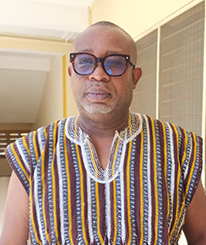Welcome and Study with Us

Head of Department
Welcome to the Materials Engineering Department, Kwame Nkrumah University of Science and Technology, Kumasi (KNUST). I am delighted to extend a warm welcome to all visitors to our site.
The Department offers undergraduate programmes in Materials and Metallurgical Engineering. These programmes train students to utilize their knowledge in physics, mathematics and chemistry to explore and understand the interplay between processing, structure and properties in metals, ceramics, polymers and composite materials. Students gain a broad knowledge that helps them in developing new materials and/or improving on existing materials with improved performance for diverse applications such as in nanotechnology, aerospace, energy systems, electronics, mining, and medicine. The Metallurgical Engineering program also covers sustainable extraction of metallic materials from their ores into useful products. There is a high demand for our graduates from different types of companies/industries which is evidenced by the high rate of placement of graduates who have taken the Materials and Metallurgical Engineering programs offered here at KNUST.
Postgraduate programmes in Environmental Resources Management (distance learning (IDL) and regular), MPhil and PhD in Materials Engineering are also offered at the Department. These programmes are tailored to equip graduate students with advanced skills and knowledge in materials and environmental issues. These open doors to our postgraduate students in career advancement, research environments and personal development among others.
The Department is involved in various research activities across several specialized areas. Four key areas are: Electrochemistry and Energy Materials (Developing sustainable energy solutions), Functional Materials (Designing materials for biomedical devices, water purification, and construction), Process Metallurgy (Promoting responsible mining practices and recycling technologies) and Materials Modelling and Simulations (Optimizing material performance using advanced software).
In Ghana, our research improves energy access and reduces carbon footprint, enhances healthcare through better medical devices, provides clean water and sanitation for rural communities, promotes responsible mining practices and environmental protection, and fosters economic growth through innovative manufacturing.
Globally, our work contributes to the sustainable development goals (SDG), mitigates climate change through renewable energy, advances medical technology and healthcare outcomes and promotes environmentally responsible resource management.
We appreciate your interest in the programmes and activities being offered in the Department and look forward to helping you to experience the core of engineering technology.